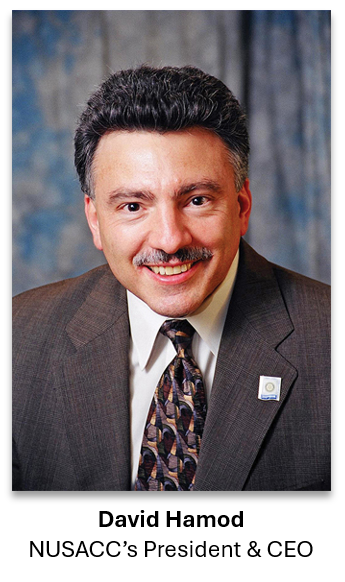Abducting Students: At What Cost?

David Hamod Op-Ed in The Des Moines Register (4/13/25)
In recent weeks, the world has been shocked by images of masked and hooded individuals – apparently U.S. Government officials – rounding up college students for detention and deportation.
This is a stunning development, one that inflames passions and sensibilities. Discussion of this issue so far has rightly revolved around freedom of speech, civil liberties, and due process.
But now is the time for U.S. policymakers to consider the impact that these abductions are having worldwide. America prides itself on our rule of law, and seeing students accosted and “disappeared” from our nation’s streets is deeply troubling. Parents around the world are understandably disturbed by such authoritarian tactics, and their immediate reaction will be to keep their children out of harm’s way (i.e.- out of the United States).
These abductions have begun to have a chilling effect that we have seen only once before in recent memory: In the months and years after September 11, 2001, enrollments by Arab and Muslim students in U.S. colleges and universities plummeted. This includes the countries of the Middle East and North Africa (MENA), where chambers of commerce like NUSACC promote U.S. goods and services.

In 2004, in the aftermath of 9/11, the National U.S. – Arab Chamber of Commerce (NUSACC) quantified financial losses resulting from restrictive American visa policies targeting the Arab world. These policies contributed to a precipitous drop in Arab and Muslim visitors, including students. Click here to view the report.
Visits from Saudi Arabia to the USA, for example, plunged 73 percent, from 84,000 in 2001 to 23,000 by 2003. Over the same period, U.S. exports to the Kingdom fell $1.6 billion – approximately $27,000 in trade for each Saudi visitor turned away by the USA or intimidated into canceling plans to visit the United States.
In 2004, our chamber conservatively estimated that stricter visa policies cost the USA more than $5 billion per year from the MENA region alone in commerce, tourism, medical treatments, and higher education. (The report did not take into account likely losses of new investments or disinvestments by the Arab world, which would mean billions more in revenue losses.)
Five billion dollars in 2004 translates into $8.46 billion in 2025 dollars, based on the Consumer Price Index, a figure that wildly underestimates potential financial losses to the United States today. (President Donald Trump wants to sell $1 trillion worth of U.S. goods to Saudi Arabia, for example, and the UAE has pledged to invest $1.4 trillion in U.S. enterprises.)
Remarkably, what NUSACC said in 2004 still holds true today: Driving away America’s friends – including international students – has the “unintended effect of strengthening the hand of extremists who want to drive a wedge between the United States and other nations around the world.”
The biggest loss of 9/11 was the lives of nearly 3,000 innocent Americans. The second biggest loss, in my opinion, was the “lost generation” of foreign students who decided against studying in the United States because of anti-Arab and anti-Muslim backlash after 9/11.
Individuals who were students in 2001 have gone on to become distinguished global leaders. But students who chose not to study in America after 9/11 have no particular affinity for the United States, and they are understandably shocked by images of abductions by U.S. Government officials.
Roundups of foreign students, including those from Muslim-majority nations, undermine America’s commitment to the rule of law and our country’s image around the world.
No one benefits more than China, whose rapidly expanding partnerships in the MENA region are eroding U.S. influence and challenging America’s strategic interests. China’s trade with the MENA region almost doubled (to over $500 billion) from 2017 to 2022, and this “Look East” policy is heavily affecting sectors in which the USA has historically been dominant, including education and America’s ability to recruit the best and brightest.
Many U.S. colleges and universities are working to keep a low profile these days, but they’d better start thinking about how to replace lost income that would otherwise be provided by international students, who contributed nearly $38 billion to the U.S. economy in 2023 (NAFSA). And unlike American students, foreign students typically pay “full freight,” which makes them exceedingly valuable to U.S. higher education.
Abductions of foreign students on U.S. campuses may spark joy for a tiny number of interest groups. Still, counterproductive theatrics like these are not in the interest of the United States. If these students do get sent home, their appalling experiences in the USA will be amplified worldwide. This plays into the hands of America’s detractors, and it’s safe to say that no one will be lauding this twisted version of liberty and justice for all.
David Hamod is President & CEO of the National U.S. – Arab Chamber of Commerce (NUSACC). The opinions expressed here are his own.
Want more articles like this? Sign up for our e-newsletter!
Check our blog here!








